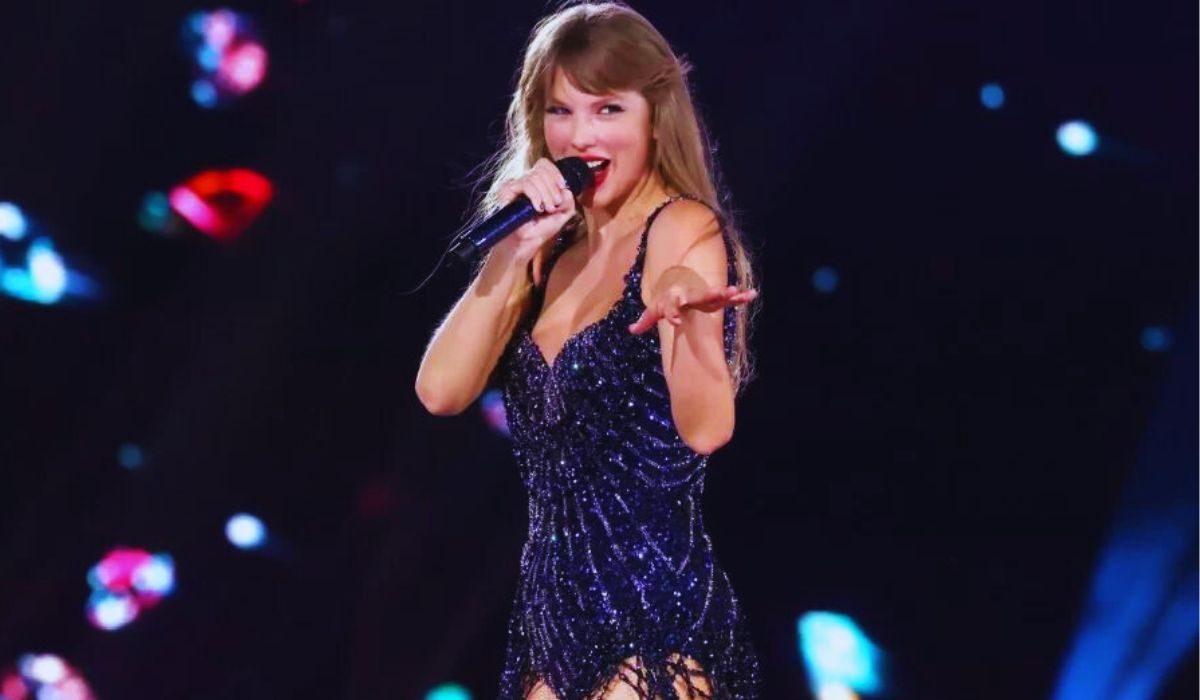Entertainment
Is Taylor Swift Overrated? An In-Depth Look at Her Immense Talent and Influence

Over the past 15 years, Taylor Swift has risen from aspiring teenage country singer-songwriter to one of the most successful and influential artists in global pop culture. Her transition from fresh-faced Nashville darling to bona fide international superstar has been remarkable to witness. However, with such stratospheric fame also comes intense scrutiny and backlash, leading many critics to cry “overrated” when assessing the magnitude of her accomplishments. But does that accusation really hold merit, or is the vitriolic side-eye simply inevitable for any artist achieving such a rarified level of success and impact? Let’s take an objective look at Swift’s career and artistic merits to assess whether her accolades and avid following are indeed overhyped or justly earned.
Commercial Performance and Accolades
When it comes to quantifiable metrics for judging an artist’s success, few can compete with Taylor Swift’s astronomical records and awards. She’s the first solo artist ever to have nine albums sell over 1 million copies in its first week. Three of those albums – Speak Now, 1989, and Reputation – sold over 1 million copies in just their first week. That’s an incredible display of consistent fandom turnout and reinforces her ability to not only attract a massive audience but sustain engagement across major album cycles spanning over a decade.
In total, Swift has sold over 200 million records worldwide across her 10 original studio albums, making her one of the best-selling music artists of all time. She’s won 11 Grammy awards, an Emmy award, 12 MTV Video Music Awards, 23 Billboard Music Awards, 12 Country Music Association Awards, and a stunning 32 Guinness World Records. While amassing awards alone doesn’t inherently equate to artistic quality, such widespread institutional recognition in all facets of the industry is a strong rebuttal to any claims of being merely overhyped.
Additionally, nearly every tour Swift has conducted in her career ranks among the highest-grossing tours of all time for respective years. The Reputation Stadium Tour stands out as particularly historic, setting the highest-grossing U.S. tour record with over $345 million grossed just domestically. This was despite higher ticket prices and avant-garde minimalist stage production compared to many other elaborate concert events. Clearly, fans weren’t simply getting swept up in ephemeral hype cycles but willingly investing time and money at an exceptional scale.
Songwriting Prowess and Versatility
While chart dominance and commercial popularity alone certainly don’t preclude an artist from being overrated, a closer look at Swift’s highly acclaimed songwriting craft solidifies her credibility. What makes Swift’s pen so formidable is her ability to seamlessly blend exquisite lyrical storytelling with universally resonant themes exploring everything from romantic idealism and disillusionment to issues encompassing the human experience like self-worth, insecurity, and overcoming adversity.
Songs like “All Too Well,” “Dear John,” and “Champagne Problems” demonstrate Swift’s expert narrative songwriting techniques as she paints deftly poetic yet intensely personal vignettes with cinematic flair. She excels at grounding heady abstract themes in tangible emotionally potent details that make philosophical perspectives feel intimately visceral and real.
On the flipside, smash hits like “Shake It Off,” “Blank Space,” and “Anti-Hero” showcase her more playful self-effacing side as she satirizes public perceptions and media narratives about herself. Using barbed wit and keen self-awareness to poke fun at her own celebrity unravels any notions of being an isolated, overhyped brand lacking dimensionality and substance.
What makes this balance all the more impressive is how seamlessly Swift has transitioned across genres while adapting her songwriting voice dexterously. Few artists have so convincingly traversed country traditions as she did on Fearless more pop/rock-influenced efforts like Red and commercial juggernaut 1989 to experimental atmospheric explorations like Folklore and Midnights. While her former country peers have struggled mightily to remain relevant, Swift has adroitly evolved with the times, intuitively expanding her sonic palette with each successive effort.
Artistic Growth and Storytelling Vision

Some pop culture critics may scoff at Swift’s youth and presume her ascent to be a mere byproduct of manufactured teen idol hype, but a closer look at her artistic growth paints a different picture. Starting from humble beginnings as a preternaturally gifted yet conventional pop/country singer-songwriter, Swift has transformed into an eclectic visionary multimedia storyteller exhibiting formidable ambition and a peerless drive to continually reinvent herself and push creative boundaries.
From her spoken word poem interludes and intimate self-directed music videos exploring themes of youth disconnection and integration to her conceptual visual albums packaged as prestige novels brimming with easter eggs and cryptic embedded lore, Swift has methodically honed a multilayered artistic voice born of astonishing discipline and tireless vision. She’s blurred the line between pure songcraft and transmedia world-building, unlike any contemporary pop auteur.
With her critically acclaimed turn on the big screen in the David O’Russell film Amsterdam and potential ventures into directing on the horizon, it seems this metamorphosis into a holistic pop performance artist may just be the tip of the iceberg for her manifold creative energies. Swift appears uniquely positioned to traverse genres and mediums, evolving into a full-blown prestige entertainment mogul in the vein of her childhood idols like Paul McCartney.
Authenticity and Emotional Resonance
For all her creative achievements and commercial dominance, perhaps Swift’s greatest gift is the authenticity and emotional resonance through which she connects with audiences. So much of her appeal stems from her abilities as an open-book diarist whose lyricism and persona exude an endearing blend of vulnerability, candidness, and approachable humor in confronting very human flaws and neuroses.
Many admirers see themselves reflected back in her unflinching confessional narratives about navigating social insecurity, the craving for validation, bouts of crippling anxiety, and the rollercoaster vicissitudes of turbulent romantic relationships. She’s not afraid to disclose ugly personal details or paint herself as the outright villain in some scathing character studies of her own worst impulses. This kind of nakedly authentic self-reflection is incredibly uncommon in Top 40 entertainment, but Swift’s bravery to openly expose herself paradoxically reinforces loyalists’ parasocial bonds with her all the more.
Coupled with that openness is a profound empathetic emotionality investing her songwriting with an instantly cathartic catharsis. From the scorned fury of “Dear John” and utter devastation of “Marjorie” to the nostalgic melancholy of “tis the damn season” and wide-eyed romantic idealism of “Lover,” Swift lends such palpable textures to acute emotional states that audiences readily absorb those indelible imprints into their own lived experiences.
In an era of increasing isolation and detachment, that rare ability to use art as a conduit for the deepest resonances of the human condition undoubtedly underpins Swift’s unique emotional stronghold over the hearts and minds of fans worldwide. It renders any accusations of being “overrated” or “overhyped” rather simple-minded, as it utterly negates the profound respect and ineffable magic she inspires within those who cling to her music, words, and spirit as an emotional life preserver.
Trailblazing Influence and Legacy
Beyond her artistic and commercial achievements, Taylor Swift also stands out as one of the most influential and impactful entertainers in recent memory. She’s been a vocal supporter and ally for LGBTQ+ rights, feminism, and other progressive causes. Swift was one of the first major pop stars to publicly take a political stance against discrimination and rally young voters to make their voices heard – risky moves that could’ve easily alienated portions of her fanbase but which she undertook on moral principles.
Likewise, her staunch advocacy for artist rights in the music industry and her much-publicized battles to regain control over her master recordings have kickstarted a larger conversation about reforming label practices and intellectual property issues. Few singers at the apex of fame would jeopardize their careers to so vocally oppose institutional powers, but Swift’s willingness to leverage her platform and fight for systemic changes that protect creative autonomy is an inspiring trailblazing ethos.
It’s that combination of compassionate social consciousness, moral leadership, and unflinching artistic authenticity that have cemented Swift as a once-in-a-generation voice for the current youth zeitgeist. She’s not just reflected back the understandable anger, melancholy, and uncertainty of growing up in tumultuous times, but consistently demonstrated how to convert pain into resonant art while advocating for ideals extending far beyond music.
Hype may eventually fade and commercial metrics can always be exceeded, but the enduring emotional resonance and sense of inspirational possibility Swift has emblazoned upon multiple generations of fans transcends any quantifiable metrics. In 20 or 50 years, her role in the culture may very well be viewed as canonically influential as icons who helped steer the social discourse of their respective eras.
For those reasons and more, Taylor Swift’s hard-earned accolades and reverence from legions of adoring fans feel entirely commensurate with her historic impact and catalog of indelible songwriting. She is neither artifice nor flavor of the moment, but a hardworking, disciplined talent who makes good on the hype with emotionally resonant art of incredible depth and potency. Claims of being overrated simply don’t stand up to scrutiny when considering her plain-faced authenticity and the often tectonic influence she wields across so many intersecting disciplines and ideals. Taylor Swift is simply one of the defining voices of at least one generation, and perhaps even more across generations to come.
